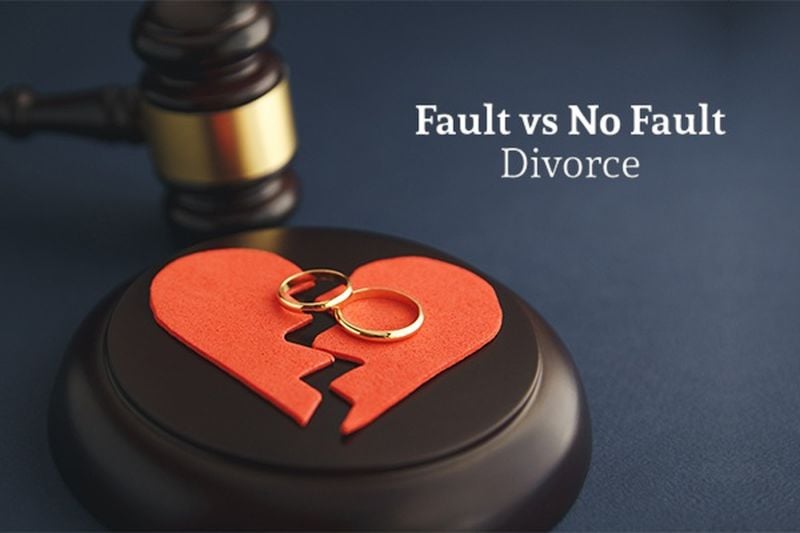When you’re going through a divorce in Texas, you may feel isolated and as if no one understands what you’re going through. Both are perfectly reasonable reactions to a difficult situation that can feel like a slow-motion car wreck.
And, as difficult as things may be, knowing you aren’t alone can be reassuring. Understanding the top reasons for divorce, at the very least, may help you make sense of the forces that have driven you apart.
Or maybe things just seem “off” with you and your spouse lately. Your arguments have become more frequent and your fights last longer. All marriages hit a rough patch sooner or later. Knowing why people get a divorce may help you learn from the mistakes of others so you can right the ship.
1. Money • 2. Lack of Intimacy • 3. Infidelity • 4. Domestic Abuse • 5. Lack of Compatibility • 6. Physical Appearance • 7. Substance Abuse and Addiction • 8. Getting Married at an Early Age • 9. Getting Married for the Wrong Reasons • 10. Communication Problems • 11. Lack of Equality and Identity • Main Warning Signs of Divorce
Most Common Reasons for Divorce
With that, let’s take a look at the most common reasons for divorce.
1. Money

What is the top cause of divorce in America?
It depends on who you ask.
People divorce for a variety of reasons, as you can see. According to some studies, the primary reasons are communication problems, growing apart over time, or domestic or substance abuse.
The rankings will differ from study to study, but one of the most common causes of divorce is always money. Money issues can drive married couples insane because money affects so many aspects of everyone’s lives.
No matter how much money you have (or not), there’s always the issue of money as a primary connector in marriage. That means it’s also a primary flashpoint for arguments and in many cases, a motivating factor in divorce.
Money issues can wreck a marriage in so many different ways.
Spouses who use credit cards recklessly can rack up large debts without their spouse’s knowledge. One spouse may earn significantly more than the other, resulting in resentment and control issues.
Long-term financial goals may be different for each spouse. One spouse prefers to “live for today,” while the other prefers to save every penny for retirement.
One spouse desires a new car every two years, while the other is content with any vehicle that has already been paid off.
Money can be especially important to the degree that you don’t have it. When one spouse or the other loses a job or significant unexpected financial setbacks take place (think job loss, health crises, etc.), it can cause a big squeeze on family finances that may last for months or even years.
Money issues cause stress. Stress chokes off communication. A lack of communication leads to breakdowns in trust. And the result is often divorce.
Money problems are difficult to resolve, but the best way to do so is to create a budget and long-term goals and stick to them. Make a concerted effort to maintain open lines of communication regarding financial interests, especially during difficult times.
You will almost certainly have financial disagreements during the course of your marriage. However, just like any other marital problem, if you face financial challenges honestly and as a team, your marriage has a much better chance of surviving.
Related: Legal Separation vs Divorce: What’s the difference?
2. Lack of Intimacy

Marriages become less about physical contact and more about a transition to a deeper and more spiritual kind of love over time. That is typical. Sex is still an important part of every marriage at every stage, but intimacy is much more than just sex.
Newsweek magazine estimates that 15 to 20 percent of couples are in a sexless relationship. Studies show that 10% or less of the married population below 50 have not had sex in the past year. Also, less than 20% report having sex a few times per year, or even monthly, under age 40.
However, it doesn’t mean that intimacy should disappear from marriage even when the physical side becomes less frequent. There are other ways to be intimate with your spouse. You can show affection through small acts like daily kisses on the cheek, hugs, and holding hands, backrubs, and foot rubs, or even phone calls to say “I love you” from time to time.
Intimacy involves paying attention to your spouse. It’s the sign of a healthy marriage to ask about the type of day they’ve had, if they’re worried about something, if they’re hiding little nagging aches and pains, or if they want someone to listen to their problems attentively after a long, hard day.
When these small acts of intimacy are no longer present, each partner may feel rejected. This can have a negative impact on the overall quality of a relationship. This can lead to intense feelings of being unloved and unappreciated over time.
If your marriage is on the rocks, be sure to get the support you need. Take care of your mental health. Consider talking to a therapist.
3. Infidelity

Extramarital affairs are a fairly obvious reason for divorce. Surprisingly, many married couples have dealt with infidelity issues and managed to stay together.
That doesn’t mean you should roll the dice if you’re considering venturing outside the marriage.
The reality is infidelity fundamentally changes your marriage. It erodes trust and leads to a breakdown in communication.
Sooner or later, infidelity usually catches up with you which is why it is one of the leading causes of divorce.
Even if your marriage survives, it will be fundamentally altered for the rest of its life. You’ll either admit to being a cheater or carry around a fair amount of guilt (assuming you have a conscience) for years.
People cheat for different reasons. Passion fades over time. The thrill with your spouse is gone, but the desire for thrills remains.
Sometimes it has to do with anger and resentment over something a spouse is doing. Cheating may take place due to a lack of self-esteem. At other times, it may be something as simple as a difference in sexual appetite or a lack of intimacy that needs to be satisfied.
Infidelity may also start as a causal relationship that evolves into an emotional affair, and then becomes a physical affair. That is often the case with people in work situations who spend large amounts of time together.
According to Divorce Statistics, 22% of men have committed at least one act of adultery in their lives. Also, 14% of married women have had affairs at least once during their lives. As many as 36% of men and women have admitted to having an affair with a co-worker. And, 70% of married women and 54% of married men did not know about their spouses’ infidelity.
Related: How To File for Divorce in Texas
4. Domestic Abuse
If there is a pattern of domestic abuse in a marriage, that’s certainly a valid reason to walk away from your marriage.
Many people think that abuse is only physical, but emotional and financial abuse are also quite common. Yelling, neglect, constant displays of anger, withholding money, vulgar comments, and other negative displays can be just as damaging.
Abuse is not just directed at a spouse, either. Children, grandparents, brothers and sisters, friends, or other people who live in the same home for any reason can be targets of abuse as well. Threats to their wellbeing are just as concerning as any threats to a spouse.
In some cases, a marriage may just be going through a rough patch (as many marriages do), and any abuse may be out of character. Counseling, in this case, might be appropriate with the goal of repairing a marriage.
In some cases, domestic violence may be coupled with external issues such as substance abuse, the loss of a job, or the death of a close friend or family member. In these cases, a person may be emotionally wounded and can be helped to heal over time.
However, in cases where abuse is physical and ongoing, especially when children are involved, being together can be dangerous. Getting away should be an immediate priority.
Staying in a chronically abusive relationship is not healthy, and it is not safe. If you feel threatened in any way, get help immediately from family members, law enforcement, and social services agencies in your community.
If you’re not sure where to turn, you can also call the National Domestic Violence Hotline at 800-799-7233 or visit their website.
5. Lack of Compatibility
When you got married, you were sure your spouse was the person you wanted to spend the rest of your life with. Everything clicked.
Anything that bothered you was minor, and you shrugged it off because you were deeply in love. You overlooked faults, differences of opinions, and interests. Those were all things you could “work on” together after you said, “I do.”
But even if your marriage started in total bliss and synchronicity, time always changes things.
People grow up. You both take on new challenges. Habits and interests change. Your careers move forward. You become parents. Perhaps you both modify your political and religious views. Local and world events impact your way of thinking. Tragedies affect you. Your circle of friends breaks up. New people enter your life, and you like them, but your spouse may not.
Change is inevitable. Change is necessary. And in many cases, change is healthy. Like it or not, if you have been married for any amount of time, the person you are now is not the person you were back then. The same goes for your spouse.
If you’ve ever gone from “We can do whatever you want. It doesn’t matter to me as long as I’m with you,” to “How come you always get to choose where we go and what we do?” then you understand what a lack of compatibility looks like.
In a healthy marriage, change is welcomed. It is celebrated. But in other marriages, change means growing apart. You no longer share the same vision for your day-to-day living or your future. You no longer share the same passions that you once did.
Your circle of friends changes. More often than not, you do “your thing,” and your spouse will go off and do “their thing.” It’s unfortunate. But it happens more often than you might like to think.
At some point, spending time together is overtaken by the priority of wanting to spend time alone. That’s why many households have two or more televisions, dens, mancaves, she-sheds, and other places of sole refuge in the home.
That lack of compatibility often leads to lots of arguments. Things that used to roll off your back don’t any longer. You are constantly unhappy. You go from having great expectations to just seeking a way out. And in some cases, distancing yourself from your partner may also lead to acts of infidelity as you try to replace what you’ve lost in your marriage.
6. Physical Appearance
Growing apart in your marriage because of physical changes in you or your spouse may appear shallow, superficial, and unfair. However, it is a real reason why marriages fail.
Men and women both want attractive spouses, and when one or both gain significant weight, it can be a real turn-off.
Conversely, when one spouse loses a lot of weight, it can also have dramatic changes in a relationship. A spouse can become more attractive to others, perhaps for the first time in their lives.
These changes in physical appearance can impact your level of intimacy, self-esteem, and many other parts of your life, including your health. That can also create a separate set of challenges for a marriage, as well.
7. Substance Abuse and Addiction

When you think of addictions, you probably think of drug or alcohol abuse.
But addictions come in many forms. All of them can threaten the very survival of a couple staying together.
When couples become estranged, they may develop other addictions such as gambling, pornography, excessive spending, or infidelity. An addiction can take control of a spouse’s life, threatening their job, friends, and marriage.
When addiction is present in a marriage, it will cause a spouse to lie, cheat, steal, or otherwise betray the foundational trust that a marriage is built upon. It’s no wonder that addiction is one of the most common causes of divorce.
With treatment, many addictions can be addressed. But it requires focus and commitment if a person is serious about saving their marriage and their family relationships.
If you’re struggling with addiction, don’t be afraid to get professional help to overcome these types of challenges.
8. Getting Married at an Early Age

One big reason couples cite for getting a divorce is not being fully prepared for what marriage is all about.
Divorce rates are highest for couples who are in their 20s, and almost half of all divorces take place within the first ten years of marriage.
Marrying too young can cause divorce for many reasons…
Couples who marry at a young age are more likely to face financial difficulties because their careers are not yet established. They have not matured in some cases and do not understand how to communicate effectively. Without experience to guide them, a lack of maturity will frequently triumph over a more mature approach to marital problems.
Young marriage problems can be further aggravated when a couple decides to have children at an early age as well. The amount of energy, effort, and financial resources required to engage in parenting can challenge a couple at any age. But when parents are still children themselves in some ways, the burdens of being a parent are overwhelming.
Getting married later in life means you have experienced more of what life is about. You tend to draw on more experiences and have a better understanding of how to deal with hardship.
You have also been living on your own for a more extended period, so you better know what is required to meet the demands of living day-to-day.
If you’ve been financially prudent and saved for those inevitable rainy days, you’ll be in a better position to respond calmly to setbacks rather than lashing out and undermining your marriage.
Related: Custody and Support of the Child in Texas
9. Getting Married for the Wrong Reasons
Some people who get married have unreasonable expectations about what marriage should be about, and they wind up bitterly disappointed when the fairy tale does not match up with reality.
Living “happily ever after” necessitates constant effort. But there is a distinction between putting in the effort and putting pressure on your spouse to make your marriage the best it can be. If there is constant tension between you, cracks in your relationship will appear sooner or later, and your marriage will be on the rocks before you know it.
There will be ups and downs in every marriage, but there should also be a natural flow and order to your relationship. During the courtship process, you should be able to feel and see that flow; otherwise, you may be marrying for the wrong reasons.
You may be blinded by the other person’s imperfections. You could be taken by how attractive they are, overlooking other character flaws. They may have a drinking or drug problem, and you may want to marry them to save them. Occasionally those reasons work out, but most just on the Hallmark channel…not in real life.
If you wake up a few years down the road and realize you’ve gotten married for the wrong reasons, it may be time to cut your losses and move on. Nobody should actively advocate for divorce, but there are times when divorce is best for both people.
Sometimes, you make mistakes.
Sometimes, things simply don’t work out.
There is no cut and dried formula for this situation.
But if you force the issue to make a marriage work for the “right reasons” that are in your head, it will lead you to coerce, argue, blame, nag and criticize your partner until they change (not likely) or until you go your separate ways.
10. Communication Problems

When you are no longer able to communicate constructively with your spouse, your marriage may be in serious trouble.
When you get wrapped up in all the layers of your life, communication can become an early casualty. Kids, your job, activities, family relations, your mental health, your community standing, and other factors can drain time and life from your relationship with your spouse.
Sometimes, you go on autopilot and make assumptions when it comes to communication. That’s just as dangerous. You are setting yourself for a ton of resentment, frustration, anger, and more that will spill over into all parts of your married life.
It sounds silly, but at times, you need to give yourself a timeout. You need to spend some time thinking about your priorities and what shape your relationship is in. Then, you must be able to set boundaries when you communicate, keeping things civil even when thorny issues come up.
Picking and choosing the right time is critical too. After your spouse has come home from a tough day at work, if you ambush them with a big hairy and serious conversation, it’s likely to result in a less than ideal response. The right time and place are just as important as the message in many cases.
Also, don’t let things fester for a long time. It makes the issue more significant and can result in feelings of betrayal.
If you’re having chronic communication problems, and need help with ground rules, see a marriage counselor. A counselor can define what those rules are and how to keep your emotions in check.
11. Lack of Equality and Identity
When you marry someone with a strong personality, it is easy to subjugate yourself when making major decisions.
An ideal marriage should include open communication and room for compromise so that both parties feel they have a meaningful stake in the partnership. That is frequently easier said than done.
Being married does not always mean being together. You can suffocate a relationship when you don’t give it the time and space it needs to flourish.
Spending time together is great, but there should be room for each person to explore their likes and interests. It’s unhealthy a vast majority of the time when you are always with each other. It’s okay to seek out friends who have similar tastes in music, movies, cultural events, and more. Maintaining your own identity helps you keep your sanity, and that is healthy.
Couples can quickly lose their individual identity, and equality issues can become more prominent when children are involved as well.
Couples may lose sight of their relationship in the midst of the enormous amount of work that comes with being parents. It’s easy to become “Ashley’s mom” or “Gary’s dad,” which is useful in certain social circles. However, if that is all you become, it can be unhealthy. When one parent is the primary caregiver and the other is the primary breadwinner, a lack of identity can arise.
Another stress on marriages with children is that there can be significant differences in how each parent thinks a child should be raised.
Some parents are more hands-off while others want to manage and engage in strict control of a child’s life. Trying to be a “cool dad” or a helicopter mom” will drive the whole family nuts. It’s cute to a point, but if it gets out of control, this can also be a driving reason why couples seek a divorce.
It’s also not uncommon as children grow and need less attention that many husbands and wives realize they have grown apart. They no longer have enough in common to make the marriage last.
How many marriages end in divorce?
Today, more than 40% of all marriages still end in divorce in the United States. The divorce rate has declined from an all-time high of about 50% in the 1970s and 80s.
Why?
People are delaying marriage, focusing on their careers, and some are choosing not to marry at all.
The average age of first-time divorcing couples is 30 years old. Furthermore, approximately 60% of all divorces involved people aged 25 to 39.
Are there good reasons to get a divorce?
If you can relate to some of these common reasons for divorce, you might be wondering if there’s a good (or valid) reason to get divorced. There’re a couple ways to look at this.
The easiest way to think about this is one deals with valid legal reasons, and the other comes downs to personal reasons.
In order to get a divorce, you need to say why you want the divorce. All states have some form of “no-fault” divorce. That means you can simply check the box for “irreconcilable differences” when you file paperwork with the court. No further explanation is necessary.
However, in some states, you may be able to select a “fault-based” reason. This could be as a result of abandonment, adultery, substance abuse, domestic violence, a spouse in prison, or other similar circumstances.
Not all states allow for a fault-based divorce, and the standard of proof is higher than with a no-fault divorce. But some people choose to go this route because it can help them with related issues such as child custody or a division of assets.
Beyond the “irreconcilable differences” that meets the official test of filing for divorce, studies show that a majority of couples get divorced for many of the same personal reasons.
It’s not appropriate to say that misery loves company in this case. But at least you should be able to take comfort in knowing that whatever you’re going through, many others have already gone through as well.
Main Warning Signs of Divorce

If divorce is not a forgone conclusion, understanding the warning signs and common reasons for divorce may help you change course and work on your marriage before it’s too late.
The first step is deciding whether your marriage is worth saving. That means you’ll need to do some soul searching.
Consider speaking with a therapist who can assist you in determining what you want and why. Online therapy can be an excellent choice.
If you want to save your marriage, the best thing you can do is try to prevent problems from occurring.
Make a list of potential issues to discuss with your spouse.
Starting to see incompatibility issues, giving up on arguing due to indifference, publicly embarrassing you, when you don’t look forward to coming home, and others, are red flags you must pay attention to if you care about your relationship.
Being aware and spotting the signs of an unhappy marriage puts you back in control and buys you valuable time to address your issues.
Read More: 8 Things You MUST DO After Your Divorce is Final
Looking for more advice about divorce? Here are a few of our favorite resources:





